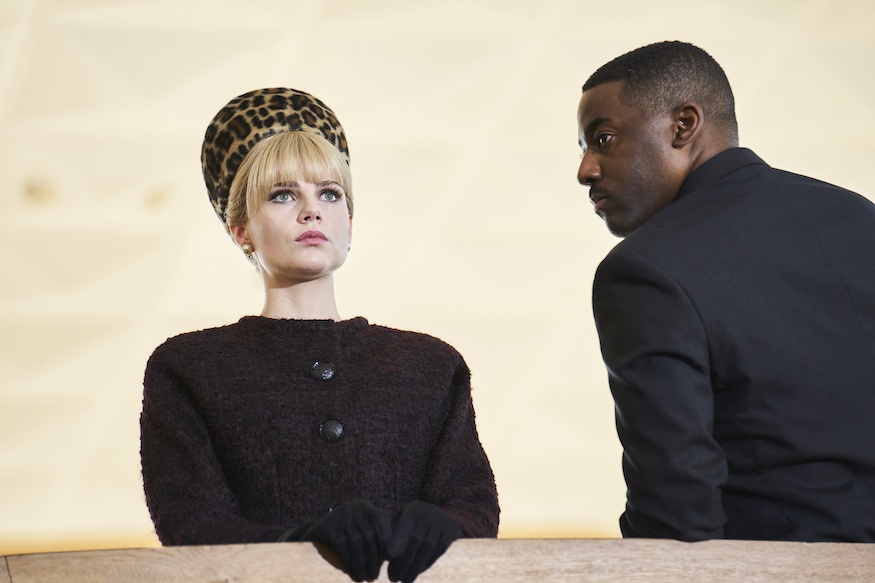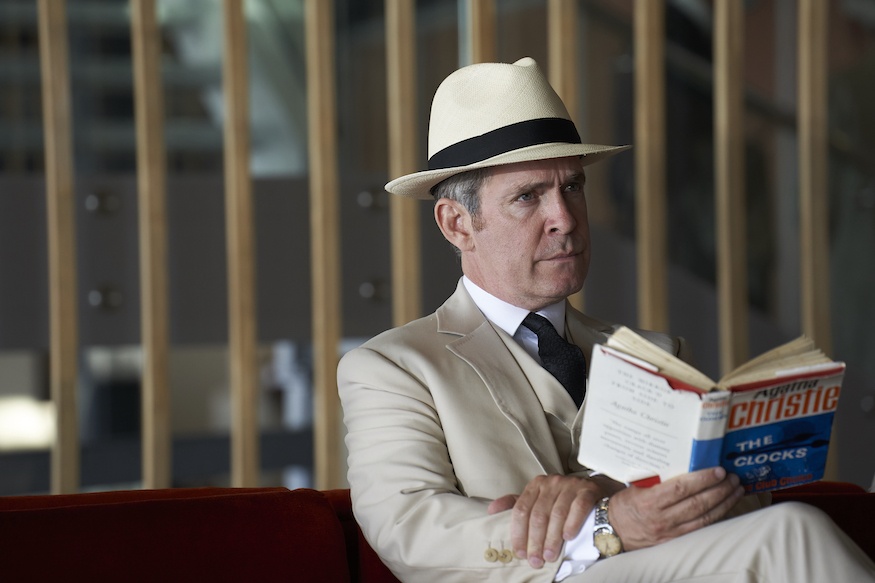
ITV’s remake of this classic 60s spy drama is loaded with glitz and glamour in the West, juxtaposed with the grim austerity of Eastern Europe behind the Iron Curtain. Of course, both facades hide a multitude of sins, and a deadly Cold War confrontation is brewing as per Len Deighton’s seminal 1962 espionage novel. It looks like no expense has been spared for this six-part series and the initial impression is sexy, witty and dangerous. While the trailers have been released, an air date hasn’t been announced but we’ll post it as soon as we have it.
The year is 1963 and The IPCRESS File gets underway in Berlin, a city brutally divided by the Wall. For spies it’s the new battleground and for the black market it’s a boon – just don’t get caught. Corporal Harry Palmer (Joe Cole) is bored with life in the British Army and the occupied city offers a wealth of opportunity for a smart man who thinks the rules don’t apply to him. Harry has a lucrative sideline, a black market operation lifting American army supplies and selling them, via a local German contact with a dodgy war record, to the Russians. The Soviet generals, and their girlfriends, love a lobster.
Harry’s latest batch of cigarettes and whiskey is about to net him a decent profit but the military police crash the party. He runs and thinks he’s got away but the MPs are waiting for him at his flat. Next stop the glass house en route to Colchester Military Prison. The judge doesn’t like the cut of Harry’s jib, or maybe it’s his mouth that gets him into trouble, anyway he throws the book at him. Nine years.
While Harry repents, or not, at her majesty’s pleasure a nuclear physicist has made a breakthrough with the next generation neutron bomb. The world is less safe but it’s a significant discovery for Britain, making the country a player on the world stage once again. Any joy the Brits derive from this triumph is short lived, though. In an audacious and meticulously planned operation, Professor Peter Dawson is kidnapped. The man is now a vital cog in national security and must be retrieved at all costs, even if that means buying him back from the kidnapper before he’s spirited away and sold to the enemy.
Major Dalby’s (Tom Hollander) clandestine unit, War Office Operational Communications, is perfect for the job. A discreet enclave of the Secret Intelligence Service, Dalby’s unit is free from Treasury scrutiny and oversight, reporting directly to the minister. The kidnapping was expertly carried out, but they do have a lead. The man in charge has a missing finger and as there are few players on the scene capable of mounting this kind operation, Polish national, Jan Pilsudski, fits the description and is top of the suspect list.

Pilsudski’s codename is Housemartin and Dalby wants to contact him, pay the ransom and get Professor Dawson back. If it can be done under the noses of the Russians, while keeping everything off the American radar, that will be a feather in Dalby’s cap. Dalby went to the right kind of school and is steeped in the British establishment so he grudgingly acknowledges they need help from a convict, but Harry Palmer is the only one with a link to Housemartin – the man who procured the lobsters Harry sold to the Russians. But this is different fish…
So Dalby has to go cap in hand to Prisoner 17315 Palmer promising to get his sentence reviewed in return for his help. The only way this works for Palmer is if he returns to Berlin to deal directly with Housemartin. Dalby knows Palmer will abscond the first chance he gets, so he has a few tricks up his sleeve to keep him in line. Even so Palmer knows Housemartin is more likely to slit his throat than play ball but an exchange is agreed. Only the operation goes badly wrong. This early action flits between the UK and Germany but that’s just the beginning, and The IPCRESS File plays out as a globetrotting action drama with no less than the fate of the world in the balance. Murder, double cross and mayhem ensue.
ITV’s adaptation of Len Deighton’s novel pays homage to the book itself – one of the great works of Cold War spy fiction –and the subsequent film which starred Michael Caine as Harry Palmer. The series is stylishly directed by James Watkins and visually references the iconic film, but it is clear early on that this is no slavish retelling of the story. Some of the opening scenes are new to the tale and key plot details and character roles are distinct from the previous works. Compared to the 1965 film, this six-parter affords more time to develop the characters and their varied perspectives, whereas both the original book and film were Harry’s story.

What is revealed is how much the personal motivations of the characters drives the larger drama in that Cold War milieu. It brings forward the contrast between the glamour and style of London and dark alleys and checkpoints of Berlin while on either side hangs the threat of global apocalypse. This story evokes the uncertainties of the early nuclear age and the divisions between East and West, and how these parallel climate change and present dangers provide the makers with new angles. It’s also about class, gender and race. Harry Palmer is working class to his core. He hates authority, has a chip on his shoulder the size of a small village and is very good at couching his hostility in sarcasm. But has he met his match in Dalby, the obverse of the coin?
Meanwhile, Dalby has his own hang ups and feels as trapped in the system as Harry does. When Harry joins Dalby’s gang he meets Jean Courtney (Lucy Boynton), and at the time it was unusual for a woman to be in this line of work. Jean is upper class, there are expectations of a woman like her, she’s engaged and no one other than her envisages her career as anything more than a temporary phase in her life. As marriage and a move to New York beckon, Jean has to decide if that’s what she wants.
Then there’s Paul Maddox (Ashley Thomas), a black CIA officer with his own difficulties wrapped up in the prejudice of the time. The original book and film were seen from Harry Palmer’s perspective, though he isn’t actually named in the novel. With the other characters seen through his eyes, they weren’t very well developed. This series gives free rein to Courtney, Dalby and Maddox’s stories too. No one is a mere foil for Harry.

One of the common traits carried over from the film is the sense of humour. Those who’ve seen and loved Caine’s interpretation of Harry may judge Joe Cole’s performance against that performance as the anti-establishment, anti-Bond spy. Cole uses humour in his own way to come out of Caine’s shadow. Anyone familiar with film and book will no doubt have fun spotting the similarities and differences – it’s hard not to compare and contrast. The series invokes tropes, the glasses and the secretary who’s actually the linchpin of the organisation. However, it flips others. Jean’s character is no longer merely a femme fatale adjunct to Harry.
For those coming to it new there’s plenty in the quality of the writing, the story and the acting to make this a big success. Joe Cole brings a cheekiness and subtlety to the role but it’s not just about him. Tom Hollander, Lucy Boynton and Ashley Thomas are all in their way excellent, making their characters intriguing and empathetic, bringing a warmth to the human drama as rich as the spy story. Everything is enriched by the moody music, the settings and the slightly off-kilter, odd angled photography that reek of the times.
The IPCRESS File by Len Deighton was released at roughly the same time as The Spy Who Came in from the Cold by John le Carré. The latter has received more recognition but together they revolutionised spy fiction, adding grit, character and blurred the lines between the good guys and the bad guys. Deighton loved reflecting the 60s vibe and it’s carried through into this adaptation, which has an authentic sense of the spirit of the book. This was an age of liberation and promise but by the end of the decade that was mired in the Vietnam War and the oil crisis. This captures the zeitgeist.
If you want more, read The IPCRESS File by Len Deighton and its sequels Funeral in Berlin and The Billion Dollar Brain, which were also adapted into films starring Michael Caine.








